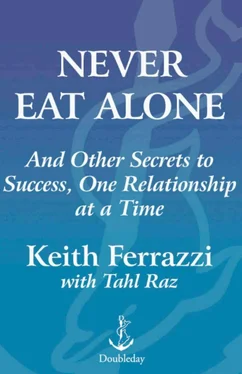Keith Ferrazzi - Never Eat Alone
Здесь есть возможность читать онлайн «Keith Ferrazzi - Never Eat Alone» весь текст электронной книги совершенно бесплатно (целиком полную версию без сокращений). В некоторых случаях можно слушать аудио, скачать через торрент в формате fb2 и присутствует краткое содержание. Год выпуска: 2005, ISBN: 2005, Издательство: C U R R E N C Y • D O U B L E D A Y, Жанр: marketing, на английском языке. Описание произведения, (предисловие) а так же отзывы посетителей доступны на портале библиотеки ЛибКат.
- Название:Never Eat Alone
- Автор:
- Издательство:C U R R E N C Y • D O U B L E D A Y
- Жанр:
- Год:2005
- ISBN:0-385-51529-4
- Рейтинг книги:4 / 5. Голосов: 1
-
Избранное:Добавить в избранное
- Отзывы:
-
Ваша оценка:
- 80
- 1
- 2
- 3
- 4
- 5
Never Eat Alone: краткое содержание, описание и аннотация
Предлагаем к чтению аннотацию, описание, краткое содержание или предисловие (зависит от того, что написал сам автор книги «Never Eat Alone»). Если вы не нашли необходимую информацию о книге — напишите в комментариях, мы постараемся отыскать её.
Never Eat Alone — читать онлайн бесплатно полную книгу (весь текст) целиком
Ниже представлен текст книги, разбитый по страницам. Система сохранения места последней прочитанной страницы, позволяет с удобством читать онлайн бесплатно книгу «Never Eat Alone», без необходимости каждый раз заново искать на чём Вы остановились. Поставьте закладку, и сможете в любой момент перейти на страницу, на которой закончили чтение.
Интервал:
Закладка:
Then you had the games world in general. The startling numbers suggested an untapped phenomenon. In 1999, games revenues surpassed movie box-office revenues. And the demographic of online gamers was changing radically as content was branching out to cater to adults and women. The average age of online gamers is now thirty-five, 49 percent of whom are women. I also learned of a German company that developed a cool turkey-shoot game for Johnnie Walker that got so many downloads, the prime minister commented that the game had become a drain on national productivity. Still, no one thought of games as anything but niche entertainment.
With the information at hand, I now had to connect the dots and find that new wagon. This is actually the fun part. You start in a fantasy world with no limitations or constraints. Instead of bashing my head against the wall trying harder and harder to solve a specific problem, I like to ask the question: "If I could use some magical potion in this situation, what could I do with all this new information?" Such fantasizing doesn't have to be, and often shouldn't be, a solitary endeavor. I get other interested parties— employees, colleagues, and insiders—to help me create wild scenarios and ask seemingly absurd questions. I did this with a small group, and we threw out each and every fantastical idea that came to us. By fantasizing, using the magic potion, and including a group of people to riff without rules, we were able to use our creativity to find a way forward.
These fantasy sessions were productive. We started to imagine how games might be applied to more than just leisure and entertainment. We started to question assumptions such as what business we were in (was it entertainment, marketing, or services?), what product we should offer (was it games, advertising, training, consulting, enabling technology?), and who our real customers could be (geeky adolescents, adults, Fortune 500 companies?). We started to visualize how we might connect the gaming medium— which had a large and growing demographic of users—and the Internet medium—which had a large and growing group of companies trying to figure out how best to use it to interact with their customers.
As an entrepreneur or an employee, you have the creative abilities to make similar connections in your own industry. How do I know? Because everyone has them! Your abilities may be stored away or infrequently used, but they are there. The question is, how do you put them to work for you? We went to work to crack this nut.
The results were significant. We realized there was an opportunity to not just sell games or sell advertising onto game sites but to create interactive games online to be used as a powerful and new immersive form of advertising. When people redefined YaYa as a marketing company rather than a video-game company, we realized our customers weren't the end users; our real customers were the companies who wanted access to the end users. The shift in focus allowed us to see games less as a product than a medium itself, able to deliver any kind of message one wanted to send. You could use games to train and educate employees, as advertising vehicles, in brand-awareness campaigns, in direct one-to-one marketing, as a means for collecting data on the preferences of customers, and so on. Where television eventually turned to commercials to replace the on-air radio personality, games could replace banner ads on the Internet.
And thus the unique point of view for YaYa was born. We began to trumpet advergaming and edutainment as the next powerful communications medium, an untapped marketing segment perfect for product placements, branded gaming events, custom games-related training for businesses, and on and on. It wasn't long before I was not only attending games conferences but also speaking at them.
Once a resonating pitch is perfected, getting attention is less of a problem. Journalists are hungry for ideas. Getting access to them is often as simple as calling the magazine or newspaper they work for, which can be found on their Web site, and asking to speak with the reporter that covers your beat. I've never met a journalist with a gatekeeper. Moreover, I've never had my calls go unreturned after leaving a message that said, "I've got the inside scoop on how the gaming industry is going to revolutionize marketing. I've appreciated your work for a long time now; I believe you are the right person to break this story."
I've been leaving those kinds of messages on reporters' voice mail for years, and reporters are hugely appreciative. Most of the time, the story doesn't even involve my company or me. I'm just building the credibility I'll need when the day comes to make my own pitch. Which is probably why, today, I know people in top positions at almost every major business magazine in the country.
I've had fellow CEOs who view, say, the Wall Street Journal or Forbes as impenetrable institutions; they shake their head in wonderment at how over and over again, no matter where I'm at or what organization I represent, I never fail to get press. The answer is that I understand and give them what they need: great stories.
However, I've also had a lot of help. Once I had developed YaYa's unique point of view, for example, I brought it to the ad agencies. It was interactive agency KPE that brought YaYa and advergaming to market. They were the agency to "discover" us and what we were doing. And then the big games companies got involved. I went to the most progressive guys I knew, people like Bobby Kotick, the CEO of Activision who, in a partnership with the Nielsen Company, put his company's influence and money behind measuring how effective games were as a medium for advertisers. Bobby and I would be on CNN or CNBC back-toback plugging each other's ideas.
"Keith, what's your secret? Bribes, blackmail—come on, just tell me," one CEO friend jokingly asked after YaYa appeared in a major spread in Fortune, while his own company, which was four times larger than YaYa, and several years older, had barely made it into its own newsletter.
So I told him: "Create a story about your company and the ideas it embodies that readers will care about. That's your content. Then share it. Have you ever picked up the phone and actually talked to a reporter about why you think what you do is so special? You cannot outsource this to PR; journalists deal with thousands of PR people a day. Who's going to be more passionate and more informed than you? You're the expert on what you do."
They Can't Outsource Content Creators
We've seen how content helped transform a company into a recognizable brand. But what if YOU are the brand? What's your content? What hooks are you selling? The same process we used to figure out how to make YaYa interesting to the marketplace can be applied to making you interesting to your network and beyond.
A unique point of view is one of the only ways to ensure that today, tomorrow, and a year from now you'll have a job.
It used to be that two arms, two legs, and an MBA were a oneway ticket to the executive office. That's barely the price of entry these days. In America's information economy, we frame our competitive advantage in terms of knowledge and innovation. That means today's market values creativity over mere competence and expertise over general knowledge. If what you do can be done by anyone, there will always be someone willing to do it for less. Witness all those jobs moving offshore to Bangladesh and Bangalore. The one thing no one has figured out how to outsource is the creation of ideas. You can't replace people who day in and day out offer the kind of content or unique ways of thinking that promise their company an edge.
Content creators have always been in high demand. They get promotions. They're responsible for the Big Ideas. They're regularly asked to speak at conferences and are featured in newspapers and magazines. Everyone within their company—and many within their industry—knows their name. They are the celebrities of their little worlds, and their fame comes from always seeming to be one step ahead.
Читать дальшеИнтервал:
Закладка:
Похожие книги на «Never Eat Alone»
Представляем Вашему вниманию похожие книги на «Never Eat Alone» списком для выбора. Мы отобрали схожую по названию и смыслу литературу в надежде предоставить читателям больше вариантов отыскать новые, интересные, ещё непрочитанные произведения.
Обсуждение, отзывы о книге «Never Eat Alone» и просто собственные мнения читателей. Оставьте ваши комментарии, напишите, что Вы думаете о произведении, его смысле или главных героях. Укажите что конкретно понравилось, а что нет, и почему Вы так считаете.












